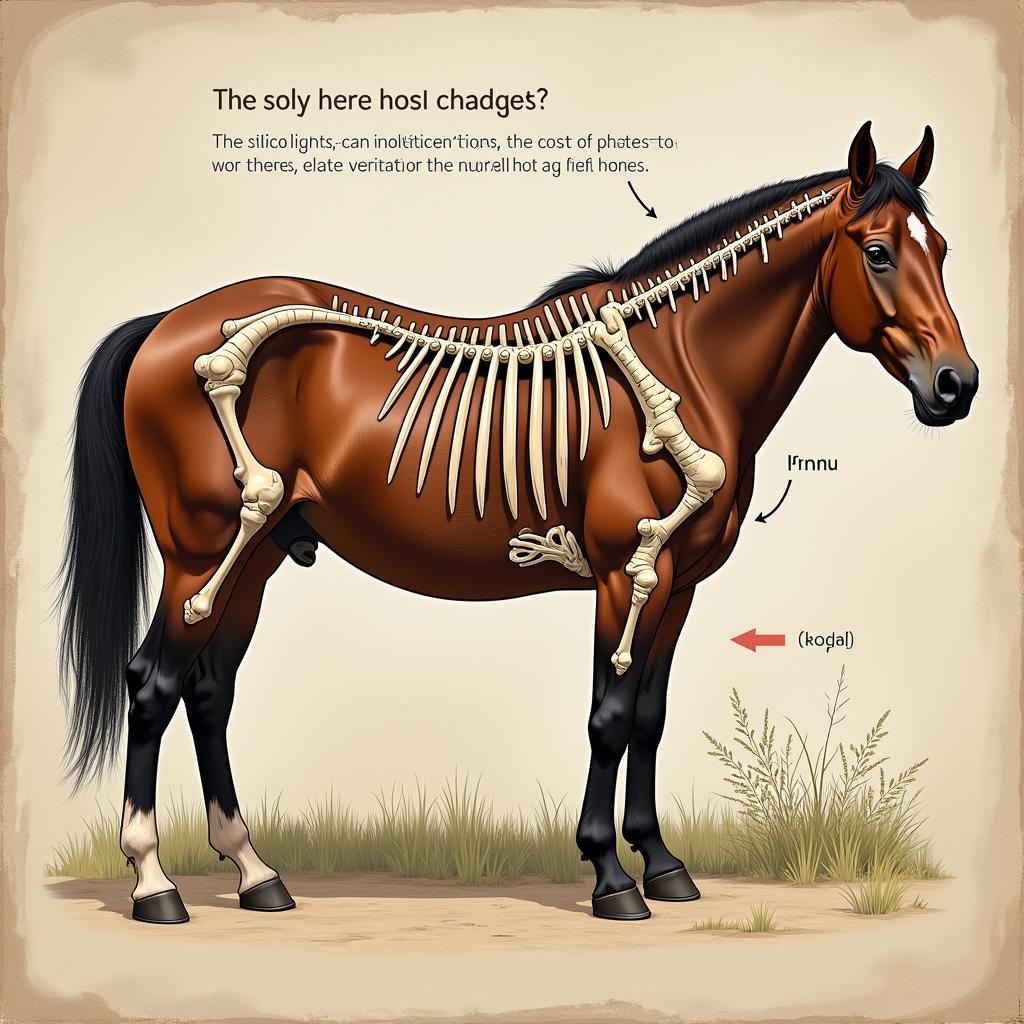An Underweight Horse can be a serious concern, impacting their health, performance, and overall well-being. Recognizing the signs of an underweight horse and understanding the underlying causes are crucial first steps in helping them regain a healthy weight. This article will guide you through the process of identifying, addressing, and preventing an underweight horse, offering practical advice and expert insights.
Identifying an Underweight Horse
Determining if your horse is underweight involves more than just eyeballing them. While a visibly gaunt appearance is a red flag, a more accurate assessment requires a hands-on approach. Feeling for the ribs, spine, and hip bones is essential. In a healthy horse, you should be able to feel the ribs but not see them prominently. The spine and hip bones should not be protruding. A horse where these bony structures are easily visible and palpable is likely underweight.
Another valuable tool is the use of a weight tape or, even better, a measure stick for horses. These tools can give you a more objective measurement and help you track progress as your horse gains weight. Body condition scoring (BCS) systems are also widely used and offer a standardized way to assess a horse’s weight. These systems typically use a scale of 1 to 9, with 1 being emaciated and 9 being obese. A healthy BCS for most horses falls between 4 and 6.
 Underweight Horse Visual Assessment
Underweight Horse Visual Assessment
Common Causes of an Underweight Horse
Several factors can contribute to a horse becoming underweight. These can range from dietary deficiencies to underlying health issues. Insufficient calorie intake is a primary cause. This can result from inadequate feeding practices, poor quality feed, or difficulty accessing food due to competition within a herd. Dental problems, such as worn or missing teeth, can make it difficult for horses to chew and digest food properly, leading to weight loss.
Parasites, both internal and external, can also contribute to weight loss by draining the horse’s nutrients. Other health problems, like chronic infections or digestive disorders, can also impact a horse’s ability to absorb nutrients effectively.
Feeding Strategies for an Underweight Horse
Addressing an underweight horse requires a multi-pronged approach. First and foremost, ensure your horse has access to high-quality forage, such as hay or pasture. Increasing the amount of forage offered is often the first step in increasing calorie intake. Introducing a balancer for horses can help ensure they are receiving the necessary vitamins and minerals.
For horses that require significant weight gain, consider adding concentrated feeds like best horse feeds or rice bran pellets horse feed. These are calorie-dense and can help put weight back on quickly. It’s important to introduce any new feed gradually to avoid digestive upset. Always consult with your veterinarian or equine nutritionist to develop a tailored feeding plan for your horse’s specific needs. “A balanced diet, addressing any underlying health issues, and careful monitoring are essential for successfully helping an underweight horse,” says Dr. Emily Carter, DVM, specializing in equine nutrition.
Why is My Horse Losing Weight Despite Eating?
Weight loss despite a seemingly normal appetite can be a sign of an underlying health problem. Parasites, dental issues, or digestive disorders can prevent a horse from efficiently absorbing nutrients, leading to weight loss even if they are eating well. “Unexplained weight loss warrants a veterinary examination to rule out any underlying medical conditions,” advises Dr. Sarah Miller, PhD, Equine Nutritionist. Early diagnosis and treatment are crucial for a successful recovery.
Preventing an Underweight Horse
Preventing weight loss in horses involves providing consistent access to high-quality feed, regular dental care, a robust parasite control program, and routine veterinary check-ups. Monitoring your horse sr and body condition regularly will also help you identify and address any potential issues early on.
Conclusion
Recognizing and addressing an underweight horse is crucial for their overall health and well-being. By implementing the strategies outlined in this article, you can help your underweight horse regain a healthy weight and thrive. Remember, early intervention is key, so if you suspect your horse is underweight, consult with your veterinarian or an equine nutritionist to develop a tailored plan.
FAQ
- What is the ideal body condition score for a horse? A BCS of 5 or 6 is generally considered ideal, but this can vary depending on breed and individual needs.
- How can I tell if my horse has dental problems? Signs of dental issues include difficulty chewing, quidding (dropping partially chewed food), and weight loss.
- How often should I deworm my horse? Consult your veterinarian to determine the appropriate deworming schedule for your horse.
- What are some good sources of forage for horses? High-quality hay, such as alfalfa or grass hay, and pasture are excellent forage sources.
- When should I call a vet if my horse is underweight? If your horse is losing weight despite adequate feed intake or showing other signs of illness, contact your veterinarian immediately.
Need help with your underweight horse? Contact us at Phone Number: 0772127271, Email: [email protected] or visit us at QGM2+WX2, Vị Trung, Vị Thuỷ, Hậu Giang, Việt Nam. We have a 24/7 customer support team.